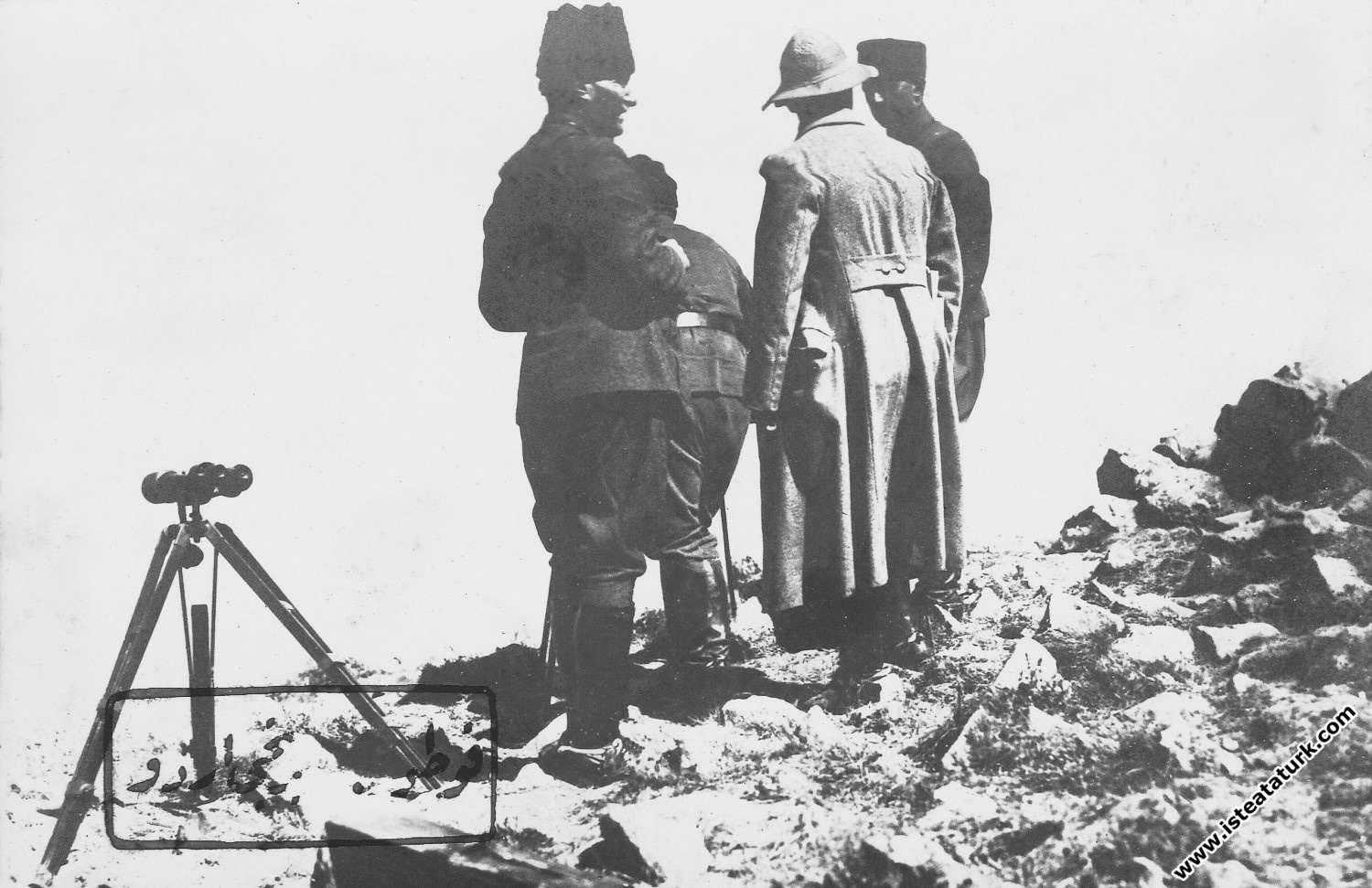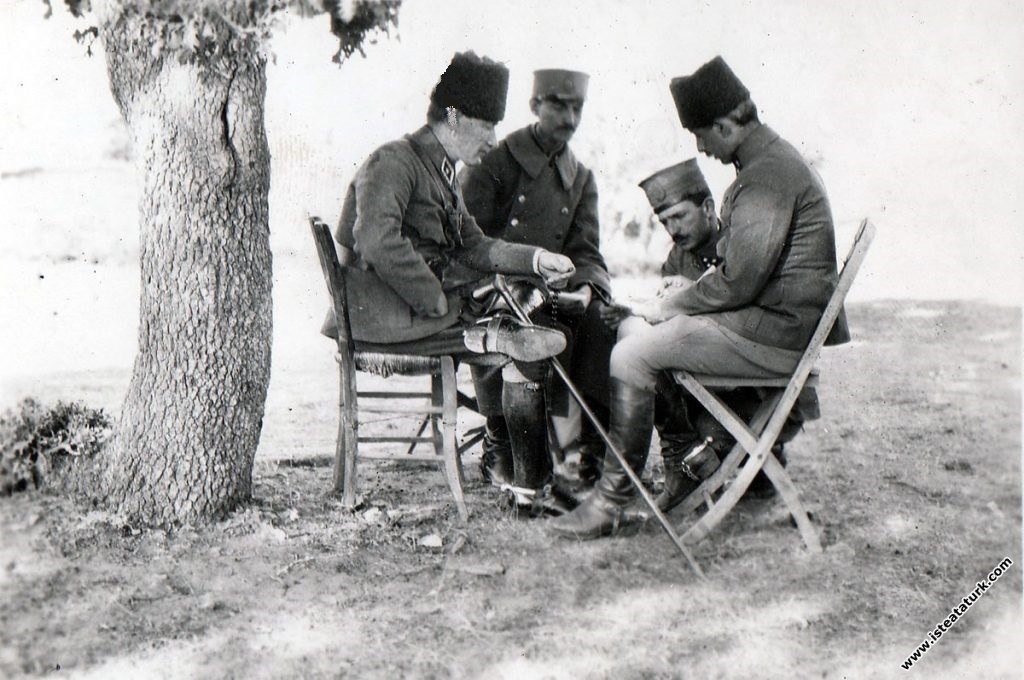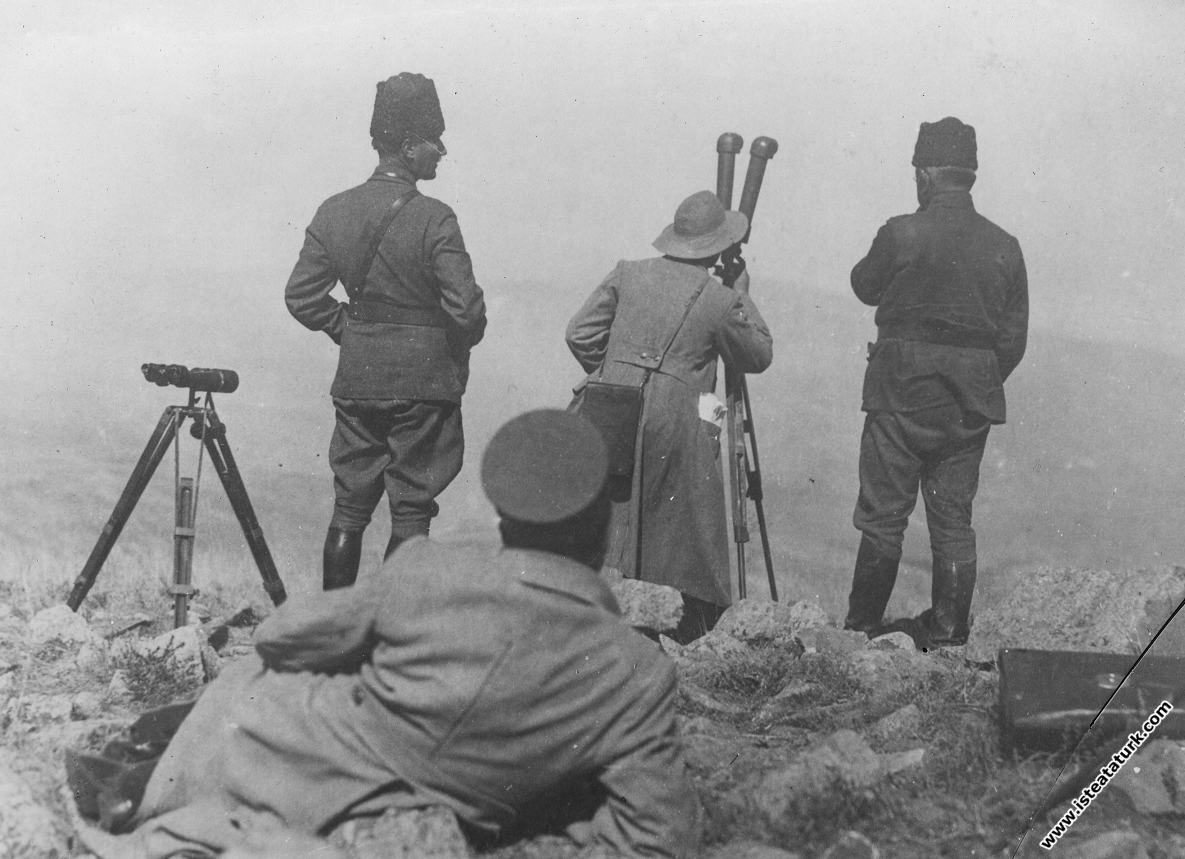Commander-in-Chief Mustafa Kemal is in Afyon Kocatepe on the morning of the Great Attack. (26.08.1922)
Commander-in-Chief Mustafa Kemal is in Afyon Kocatepe on the morning of the Great Attack. (26 August 1922)
MEMORY OF MUZAFFER KILIÇ, ATATÜRK'S ADVICE, OF THE 30 AUGUST VICTORY
The password sent from Ankara to the Front Command
(Muzaffer Kılıç, who served as Atatürk's aide-de-camp for a long time after the National Struggle years, told his memories of August 30 and the days that preceded him. As you will find the excitement of those days, which you will read below, in the memories of the old and valuable aide, who Atatürk kept with him for many years, you will find the excitement of those days. and you will stumble upon the facts that have been told for the first time.)
Defeated in Sakarya, the enemy retreated to the Akşehir - Afyon line. The Commander-in-Chief was now thinking of launching an annihilation attack, and he was preparing everything in detail so that this attack could be carried out in the form of a full deportation and redoubt raid. Some commanders did not agree with this idea of the commander-in-chief. They were doubtful that such an attack would now be successful with the means at hand. The last meetings were held in Akşehir headquarters as a military council. Fevzi Pasha was also present. The Commander-in-Chief explained his ideas in a loud voice. Despite this, the Second Army Commander did not change his opinion. The face of the esteemed Western Commander, who went out for a while, was very sad and worried, contrary to his cheerful disposition. I asked why... With a meaningful smile, he pointed to the place where the negotiations were taking place and said nothing more.
Concern of the Commander-in-Chief
The Commander-in-Chief knew that the enemy forces in Thrace were forming a large organization, that they were about to be brought to Anatolia, and that the Greek Army Commander-in-Chief, Hacı Anesti, was at the head of the organization. While emphasizing these points in his discussion, he also noted that time could not bear to wait. He was determined to act immediately without leaving the initiative to the enemy. In fact, there were not enough supplies, ammunition and artillery shells available. The Commander-in-Chief had planned that this offensive could be successful under the current conditions. In the cipher he sent from Ankara to the Commander of the Western Front before his departure to the front, he said:
"Immediate action will be taken."
“I appreciate the inadequacy of ammo and supplies and the inadequacy of other supplies. However, it would be against us to wait too long. I am moving through Konya, taking all the responsibility on me. I left some money at the command of the Commander-in-Chief to the National Defense for sacred needs.”
The last sentence of this private code ended like this:
"Immediate action will be taken."
This was a definite and clear order...
August 25, 1922... The second floor table of a village house in the town of Şuhut, about 20 kilometers south of Afyon. While the Commander-in-Chief ate his modest dinner by the light of the oil lamp; The day before, I was presenting to them the information I had obtained from the frontline artillery commander about our artillery groups. I said that the concentration of fire could continue for 3-4 hours, but that there was no need for a planned obstacle fire. "Let's leave the fire of the obstacle to them," he said. It was coming at 10 o'clock. He asked for the Vazulceish map. (Map showing the positions of the parties on the ground) He reviewed the situation of the fortifications, especially at the points where the enemy's split center weight is located, and the Ahırdağ Pass, where the cavalry corps to make the siege would pass. At the same time, between Eskişehir and Afyon, He was studying the map, carefully focusing on the enemy reserves in the Döğer area. He ordered me to measure the distance between Döğer and Dumlupınar. By hitting this point a couple of times with the pen in your hand:
"- Döğer... Döğer... But they won't be able to beat... These forces are destined to stand still," he said, turning to me:
"Collect the maps. We are moving!” he commanded.
Night of 25 August
25 August 1922, midnight... From the Commander-in-Chief, on the outskirts of Kocatepe, in the tent camp... Oil and candle lanterns in the tents... A small stream flows in front of the camp. The murmurs of water are quite obvious in the dark silence of the night... We are in a tent of a military soldier. I stand before the Commander-in-Chief, standing by.
- Your command, Pasha!
- Are we ready! says. Then he grabs the gun belt from his still intact cot and straps it on.
Muzaffer Kılıç is wrinkling his forehead with his left hand... I understand that memories are getting closer and more vivid. The change in his style of narration also shows this. It's like he was living in that moment... He noticed my attention and started to recite again. - He had his gloves on: he was shaved. We left the tent. It was pitch dark. Under the flickering light of oil and candle lanterns; From the Commander-in-Chief he began to ascend to Kocatepe. He was walking too leaning forward. We were advancing slowly, as the terrain was bad. We have finally reached the top. The Commander-in-Chief was looking ahead with his eyes penetrating the darkness. He said, "God will persecute the Turkish nation and army." This address was the manifestation of a divine inspiration in their souls...
Between 4 and 4:30 in the morning... Twilight... The filament of the Commander-in-Chief was planted in Kocatepe. Army and corps filaments surround him. The map is no longer looked at, an order is given, nor is anyone spoken... This is the big headquarters, and it's our artillery's turn to speak. An hour later...
Artillery starts firing
It's 5.30 am... on the morning of 26 August... As the Commander-in-Chief is about to look at the enemy fortifications by watching binoculars, our artillery begins to fire. What a bitter surprise for the enemy who now thinks that Mustafa Kemal is at a banquet given to foreign representatives in Ankara.
6 o'clock...
Our artillery is going into impact fire. Shrapnels are replaced by reactive grain and destruction bullets. Our infantry is about to approach the trenches. Enemy artillery starts obstacle fire. Our artillery blows up the enemy fortifications with devastating fire. Kalecik mosquito is on fire. But a concern in our artillery... Tons of ammunition is flowing like water.
The Commander-in-Chief, who inquired about the ammunition situation for a while, was also saddened by the answer he received... He calmly orders:
- The fire will continue until only one bullet remains!
Then it continues:
- We will resupply ammo from the enemy. Have the final reports arrived?
''We are in Afyon tomorrow afternoon!''
It's 9 o clock...
The splitting movement is partially successful. Apart from Çiğil Tepe, we have all the points of support... But the enemy has not yet reached the Afyon plain. On Çiğil Hill, the enemy is resisting and his defense is getting tougher. The trenches change hands regularly... We are so intertwined that the artillery cannot intervene. Artillery can only prevent the help of reinforcements. The Commander-in-Chief urgently seeks information about the enemy group of elders in Döğer and is impatient. Satisfied with the answer given.
They are ordering our reserve forces to approach to reinforce the resilient Çiğil Hill. Our Cavalry Corps, which made the siege, passes through the Ahırdağ passes.
It's almost night...
Çiğil orders the hill to be taken as soon as possible. "The hill must be in our hands before night!"
Unable to achieve this, a division commander commits suicide. Very sad from the commander-in-chief. Looking around:
- We will be in Afyon tomorrow afternoon! says.
Everyone looks at each other with suspicion and hesitation... First Army Commander:
- Pasha, you are very tired. Tomorrow you will make important and vital decisions. Sleep for 1-2 hours, he offers. It is dark, Çiğil Tepe has not been taken yet. No one believes that we will be in Afyon tomorrow afternoon in this state. However, the attack, which started at dawn the next day, threw the enemy from Çiğil hill, and the defeated forces poured into the Afyon and Sincanlı plains. They are coming to Afyon in the afternoon from the Commander-in-Chief. It has been transferred from a combat position war to an operational war.
28-29 August...
According to the orders given by the Commander-in-Chief, the enemy is being pursued and pressed. The final blow will be dealt to the enemy where Mustafa Kemal had previously planned.
Finally on August 30
30 August...
The Commander-in-Chief arrives at the First Army Headquarters in Balmahmut, Afyon. After examining the latest reconnaissance reports on the map, it moves to the 4th Army headquarters in the vicinity of Dumlupınar. The time is late afternoon.
The great soldier asks the Corps Commander:
- Sir, what is your undertaking and decision?
- My Pasha, I'm thinking of going on the offensive with the help of our party that is on the march.
- No time to think. It is necessary to get the final result without the sun grouping. Otherwise, the enemy part can be withdrawn from the skirts of the Murat Mountains and the Kızıltaş valley.
"This is the Commander-in-Chief's Headquarters."
He immediately got into his car and gave the order to descend towards the neighborhood we call Zafertepe today. Meanwhile, the 1st Army Commander warned:
- Pasha, you're coming down to the firing line!
- Your state, stay here!
And it moved. He landed between the artillery positions of a division and the hunter's trenches, where the enemy's artillery was effective.
To the Battalion Commander:
- This is the Commander-in-Chief Headquarters! he said and immediately began to give his orders.
Under the auspices of our artillery, our infantry units approach the heap where the enemy's part is located; The Commander-in-Chief was following and directing the operation with a fully shortened battery binoculars. The shells of the enemy artillery were falling very close. The Commander-in-Chief was smoking. The sun was approaching the group. Turning a range head:
- The sun is blocking our gunner's vision. But he will soon cut off the enemy's vision completely with his reflections on our bayonets, he said.
''God! God!''
After a while, 'God! God!” their voices began to be heard. The bayonets of our attacking infantry were burning under the red beams of the sun. I was astounded... As if everything depended on his will, whatever he said happened. At this moment, the Commander-in-Chief had an expression of visible anguish on his face. God! God! The death of thousands of soldiers, who fell on the enemy like an avalanche, took his human heart under its influence. He dropped his lit cigarette on the ground and straightened up in the trench, ignoring the enemy fire? This departure was a duty of honor in the spiritual presence of his soldiers, whom he loved and cherished. The great genius of military art, grand strategy, openly hated war and blood. His eyes were moist. The sun was about to disappear into the horizon. Pointing at the battlefield with his hand:
- Haji Anesti! Proud commander! Where are you? Come, save your armies... he shouted.
on the battlefield
The next day, in the early hours of the morning, Commander-in-Chief Mustafa Kemal was walking around the battlefield. He was sad and afflicted by the sight he saw. Thousands of enemy corpses and hundreds of artillery pieces piled on top of each other, abandoned cannons, ammunition...
After watching this landscape for a while:
- This sight can embarrass humanity! said. But we were compelled to do so for our self-defense. Turks do not attempt such a move in the homeland of other nations.
A little further on, a Greek flag lay abandoned on the ground among the cannons. It caught his eye. Pointing at the flag with his hand:
- It is a sign of a nation's independence. Even the enemy must be respected. Lift the flag and put it on the ball! said.
enemy commanders
- Did they bring it?
He was asking about the Commander-in-Chief sitting in front of a wooden table with a facade map in the 3rd floor hall of a large white oil-painted house in Uşak. Those to be brought in were General Trikopis, Deputy Commander-in-Chief of the enemy army, and another army commander named General Diyenis.
Two captive generals with 3-4 rows of miscellaneous insignia on their chests entered through the door. They both stood up and saluted. He stood up slowly from the commander-in-chief. He shook both of their hands and pointed to the place. The captive commanders sat down thoughtfully, timidly, and bowed their heads.
Looking at the map in front of him, the Commander-in-Chief asked both generals some questions about the course of the war. He got answers. Trikopis' statement, "We never anticipated this fate," clearly showed how the enemy was caught by surprise.
At one point, the Commander-in-Chief asked General Trikopis why the large reserve groups in Döğer did not retreat to the ridges of Dumlupınar, and he described this as "a major military mistake".
Upon the statement of General Trikopis that he was upset that he did not commit suicide, Mustafa Kemal said:
- Don't get too upset. Napoleon, a great soldier, fell into this same fate, he said, turning to his entourage:
- Let them wash and rest. “Keep it safe,” he ordered. The other day, I think, they ordered the return of their swords.
Mr. Muzaffer Kılıç stopped here in his memoir. Then slowly:
- While the honor and independence of the Turks were saved in this great battle, the foundations of Lausanne and the great revolutions were laid here. I am full of gratitude and gratitude in the spiritual presence of our Commander-in-Chief, who prepared and created this great victory, and in front of our martyrs who gave their lives for this cause...
There were two drops of tears in the fountains of his eyes.
Source: 30 AĞUSTOS HATIRALARI, Dizgi-Yayımlayan: Yeni Gün Haber Ajansı Basın ve Yayıncılık A. Ş. Baskı: Çağdaş Matbaacılık ve Yayıncılık Ltd. Şti. Ağustos 2000 Nurer UĞURLU başkanlığında bir kurul tarafından hazırlanmıştır.


